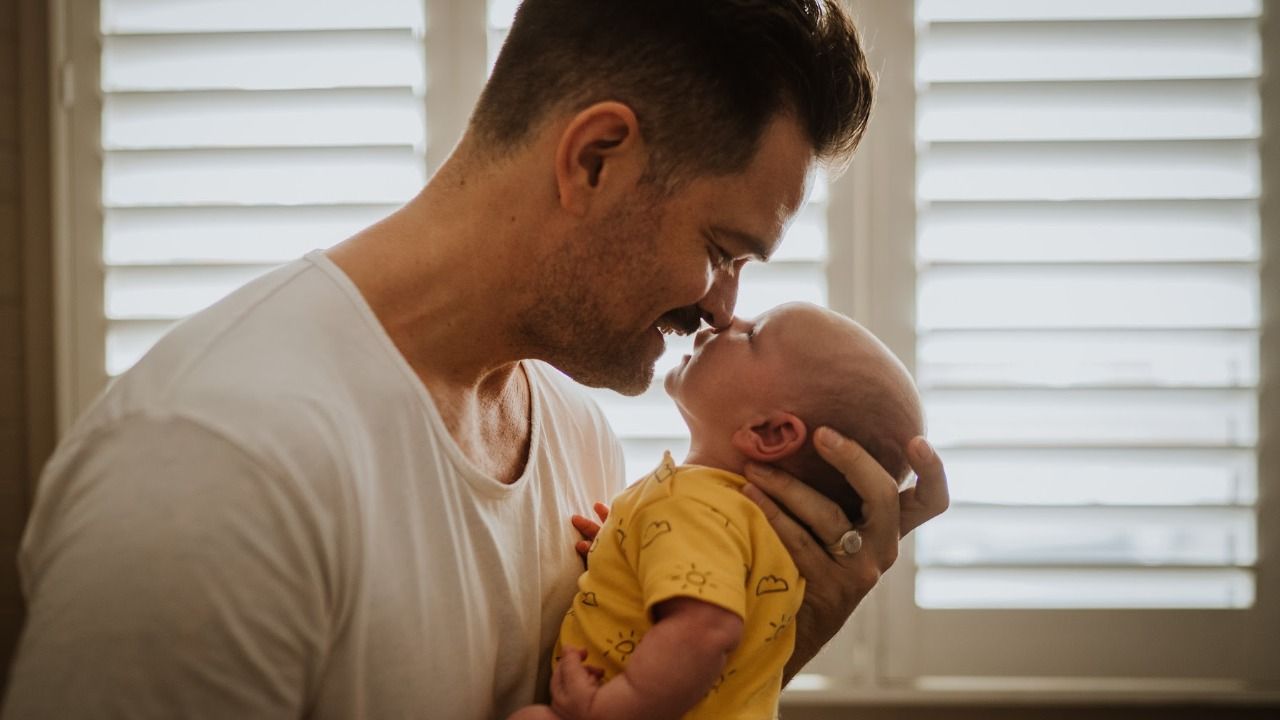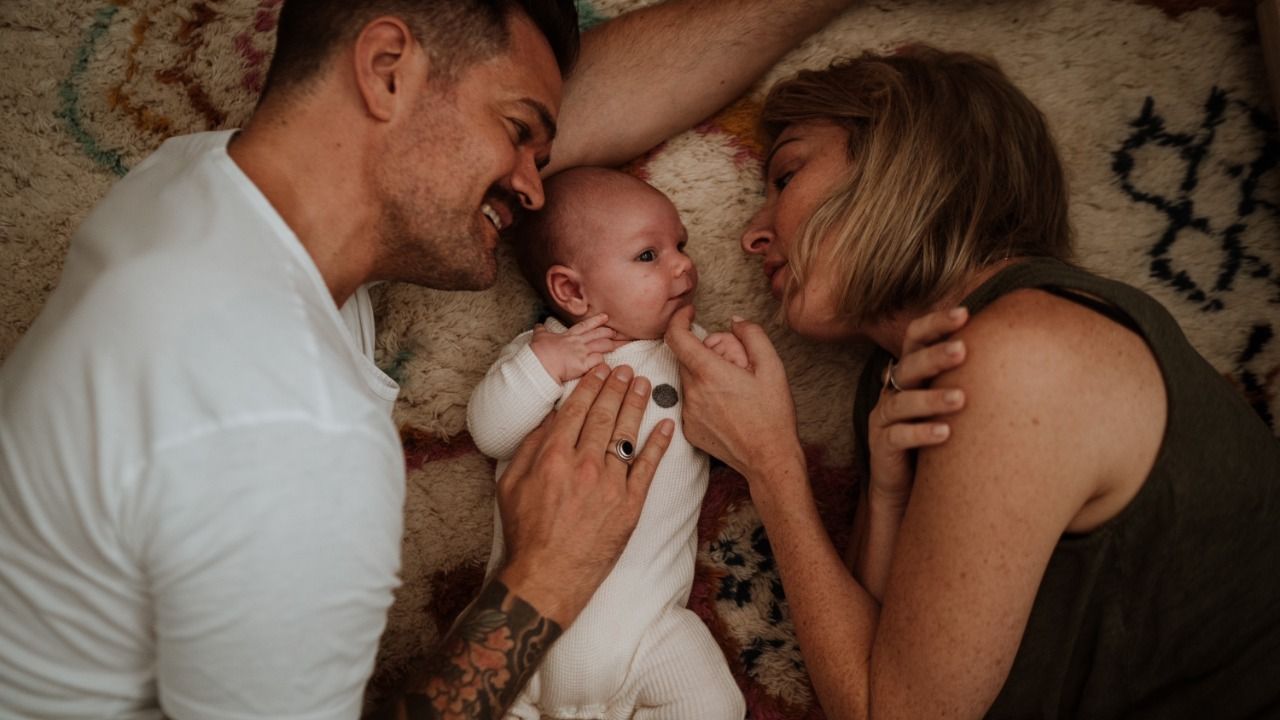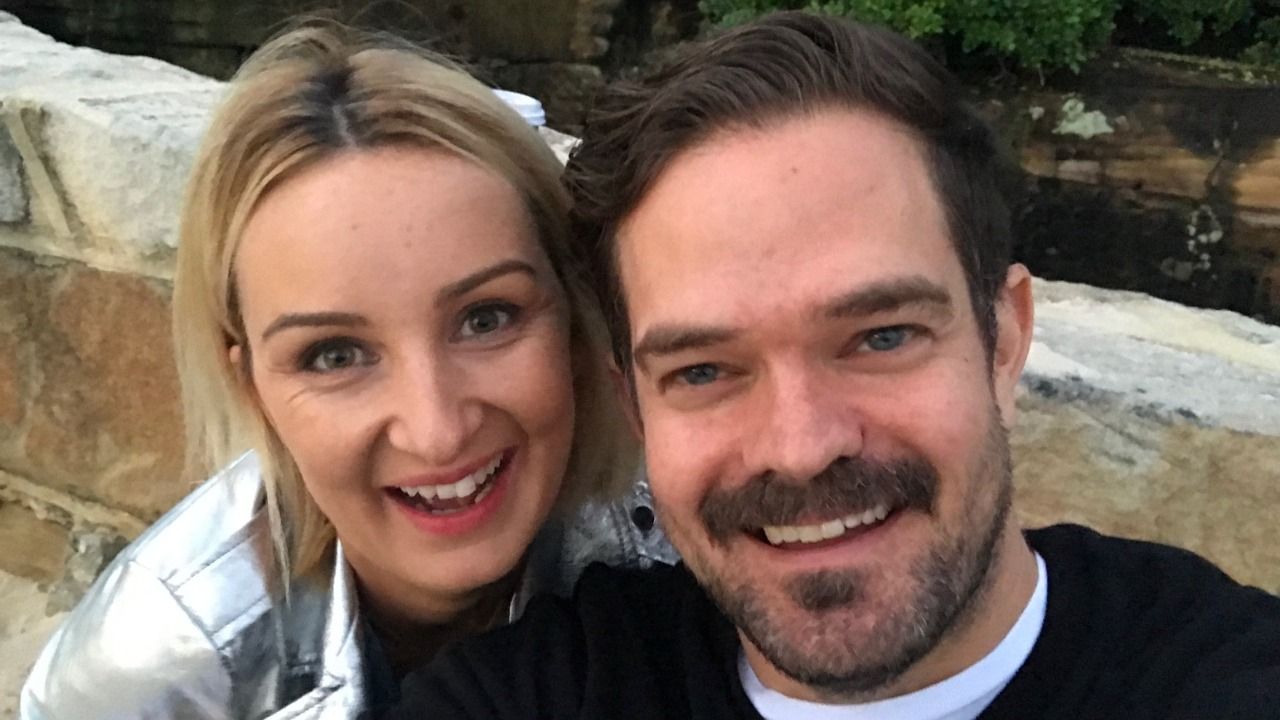




Ben Jenkins’ Prostate Cancer Journey and the Silver Mo
Every day we celebrate our men, but there’s a particular day that reminds us to stop and do this. The 5th of September is Father’s Day and we’re fighting for the Silver Mo, the one all men should get to grow. September is Prostate Cancer Awareness Month and 1 in 6 Australian men will be diagnosed with prostate cancer in their lifetime. We're on a mission to halve the number of men dying from prostate cancer by 2030.
We recently spoke to Ben Jenkins, a fellow Mo Bro, father and prostate cancer hero. Ben was at the rare age of 36 when he discovered he had prostate cancer on a GP check-up. His story is truly remarkable. We explore the physical and mental impacts prostate cancer had on him pre and post surgery, plus life beyond living cancer free. We thank Ben for his vulnerability and openness in sharing his powerful story.
Ben, are you able to tell us a little about yourself and how you discovered you had prostate cancer?
My name is Ben Jenkins, I'm a very happily married man to my wife Stacey, very proud dad to my son Bryn Maverick, living in the inner west of Melbourne. I discovered I had prostate cancer - somewhat by accident, 10 years ago at the age of 36. But at the time it was a real, pardon the pun - kick in the nuts. I'd had a little health scare for something unrelated and decided that a regular health check could be in order. On that visit to my GP he said that I was too young to be thinking about checking for prostate cancer, but that we could include a PSA test as part of the check-up. I said, cool! And the rest is history.
When you received the diagnosis from your GP, how did this impact your mental health?
When I got the news from my specialist I was in a massive state of shock. It's all a bit of a blur because I kind of dissociated. I wasn't engaging with the world around me. I was just in my head thinking of all the possibilities. I'd only just discovered what function my prostate performed, so at the time I'm wondering if this will affect my sex life mainly. My dad was taken by pancreatic cancer around 15 years prior to that so my mind often wandered into that territory as well.
If you feel comfortable sharing, what were the next steps or action plans put in place to battle the cancer?
There were several plans of attack put in front of me at the time - radiotherapy, radioactive rods implanted in my prostate, and a radical prostatectomy - which is where the prostate is removed altogether. Literally a nerve-wracking procedure, as your erections are controlled by the nerves wrapped around your prostate. With robotic surgery there was every chance that the nerves would remain intact. But you don't find that out until after the surgery, as everybody is different right?!
Having the prostatectomy was the advice my doctor gave me. The cancer had a fairly high Gleeson score, and it was the best chance of the cancer never coming back he said. That was also the advice given to me by two other doctors I got the opinion of. One of which was the father of a close friend. So that was the route I took. At the time the only thing coming up for me was that I wanted that cancer out of my body, given what I saw happen to my father, I wanted it gone.
Your prostate cancer diagnosis is unusual, can you tell us about the importance of getting checked, and at what age you should be thinking about it?
Yeah, it was unusual. Given that the advice was not to worry until you were 40+ to get your prostate checked, I am glad I followed my intuition to go to the GP, and that I said yes when he suggested the PSA test when I had no physical symptoms that would suggest a problem.
I don't think that means every bloke should be living with fear and having everything checked well before the recommendations. However, like I said, I trusted my gut and followed the signs. I have learnt about the importance of listening to my body and not sweeping any signs under the carpet like I used to. But our mental health is just as important as our physical, and we are being mentally hijacked enough in these COVID times as it is. Basically - just don’t ignore s*it coming up. Your body is always speaking to you!
How did you feel after the surgery? Did you start to think about the impacts this would have on your future?
After the surgery I felt devastated. The doctor informed me that he had to remove half the nerves on one side of my prostate as the cancer was so close to the edge. He did say that given my age erections should return, but there was no sign of that happening any time soon. They eventually did return, but it took nearly a full year and some fairly painful self-therapy to make that happen.
I also froze a couple of batches of sperm prior to the surgery. At the time I wasn't thinking about starting a family, but with the surgery it meant I don't ejaculate anymore. So, the only way to have kids is the "un-natural way" - IUI or IVF.
Like I said, at the time I didn't really think about how this would impact me down the track. But having known then what I know now, I think I might have thought longer and harder about the treatment path. I don't know if anything would have changed as I was very determined to get that cancer out, and you can't have any idea what life will be like in 10 years from now. But I do know that the road to meeting Bryn had many ups and downs. It was a challenging couple of years.
Straight out of the surgery you have to wear a catheter for a couple of weeks when you get home. And adult nappies for as long as it takes for your continence to return after that comes out. For me, with all of this being 36, it felt like a large part of my manhood had been taken away. Having to wear those nappies when I was catching up with mates and wondering if they could see the bulge just made me feel hollow. I'd lost touch with the man I knew myself to be. Like my erections, my continence did return. And it didn't take as long, which was a huge relief. But the mental load I carried for that following year while I waited to see if I would get an erection again, was still there.
No matter what age you are though, there is one thing that so many men have in common, and that is a resistance to vulnerability. For me this is one of the biggest shifts we need to make for blokes today. Even now, when I'm saying this, my natural urge is to want to talk about the positives, not talk about the pain and anguish, but instead say things like, "It was all good though", "I'm OK" or "it came good in the end" and brush over the tough times. You need to allow yourself to feel what you feel though.
I think in part, being that kind of bloke back then did make me suppress a lot of uncomfortable emotions that led me to illness. So, I believe it's not just OK to be vulnerable, it's necessary - necessary to express all of what you feel, and necessary for opening doors to connection.
Something that we all need deeply is connection with others, and connection with ourselves. For sure, I reckon that if I wasn't vulnerable at the time, and instead took the "she'll be right approach" and decided that I didn't need to get tested, then this might have been a different conversation about my life.
When did you meet your wife Stacey and how did your prostate cancer journey impact your relationship?
Stacey and I met back in early 2017. A new friend I'd made at work (who was a mutual friend of Stace's) wanted to set us up. We'd both been dating a while and had learnt to be cautious, so we picked a safe time of 3pm Sunday arvo to scope each other out. But that first drinks date rolled into dinner, and before we knew it, we'd been there for 6 hours.
We've definitely packed a lot in since then. We quickly moved in together. Got engaged within a year. Ran off to NYC and eloped 6 months later. And now just under 5 years later we have a pretty special little 18-month-old son named Bryn.
Again, that sounds pretty idyllic, and it definitely is. I could not be happier with the life we have built together. I’m definitely one very lucky man to be sitting here telling you this story right now, but it hasn’t and isn't always easy. It takes work to find happiness amongst the trauma and pain that was left behind by cancer.
Like so many blokes have learnt to do, I bottled up a lot of my past trauma. I'd got so good at it, that after I had recovered from my prostate cancer experience it was almost automatic to push aside those uncomfortable feelings when they arose. Now that can be easily achieved when you're single and you live alone. But when you're in a relationship, and you have someone who wants to connect with you on the deepest level, you can't do that anymore.
Stace is truly my hero in this regard. She has been so incredibly patient with me as she continues to encourage me to not only own those uncomfortable parts of myself, but has also taught me to want more for myself. To want more for our relationship, to find a deeper connection together and to not throw my hands up and give up.
The two biggest impacts on our relationship are our sex life, and the way we go about having a family. Like I said, my erections did return but I still need to take pills in order to maintain them. I didn't think about it early on but that has very much changed intimacy for me today. Spontaneity is very hard to achieve if you know what I mean. The experience has also left me with a lot of shame and more performance anxiety than the average bloke can imagine. This is something that we continue to work on, but even as I say that being vulnerable is key to connection. This is an area of manhood that has been very difficult for me to open up to.
Might you share some insights on yours and Stacey’s experience when trying for a baby? How did you feel when you brought your son Bryn into the world?
It's definitely been a rollercoaster. We have been going down the path of IUI - both to conceive Bryn and in trying for baby number two. Needing to go down this route has thrown up some difficulties that I personally never thought of when I opted to have the surgery. When you're trying to conceive naturally you can just have sex as many times as possible during the ovulation period. Awesome, right?! But when you do IUI there's a lot less romance, a lot more science, and a lot more anxiety.
In simple terms my frozen sperm is thawed out, tested for quality to see how much they think they should use. Then it is inserted - turkey baster style - into Stace's uterus at time of ovulation. Kinda sounds simple enough, but it's very uncomfortable and invasive for the woman. She also has to have regular blood tests and internal ultrasounds to make sure insemination is happening at the exact time of ovulation. You're then tracking it closely for a very nervous 2 weeks to see if you're pregnant.
Stace and I have documented a lot of our journey on our podcast #couplegoals? so others going through the same process can maybe feel less alone. But what we decided early on was that we wanted to consciously conceive - we made time to connect and consciously imagine our lives with our baby. We stayed close on our journey and made time to check in with each other. There were certainly moments of frustration and anger during the process, but that is normal and a very valid response. We tried hard to convey what we were going through individually and to listen to each other's experience - something that didn't come easily for me. Going through multiple IUI attempts, your hope gets chipped away a little more each time.
But when we met Bryn all that seemed to disappear. Like every new dad says, it is the most amazing and unreal experience of your life. All of the ups and downs we went through to meet him left my conscious thoughts. We had him in the most incredible way too - in the birth pool, in the kitchen of our little apartment in Sydney.
How do you feel today, 10 years on from that experience?
After I had my surgery 10 years ago, I felt a real shift in myself. I started looking after my body and mind a lot more - better food, an exercise routine, running, meditation and yoga. This has all done incredibly beneficial things for me. I think the key thing I learnt was that I had taken my body for granted, and I wanted to change that.
I also realised quickly that I wanted to share my story to help other blokes who have found themselves on a similar journey. This experience has taken me down a path of great self-discovery and to living a life more aligned with who I truly am. I’ve launched an Instagram called @woke_blokes that encourages other blokes to do the same in a safe and welcoming environment.
Stace and I are also passionate about sharing our experience and learnings from our conception journey as well. Given my age when discovering I had prostate cancer, there weren’t any blokes like me out there sharing the impacts of a prostate cancer diagnosis on their lives. Most of the blokes in the pamphlets were in the middle or twilight years of their lives. They had settled down and grown their families. So, if my story can help just one bloke like me, then I'm very grateful.
This Father’s Day, Movember is celebrating the Silver Mo - the one all men should get to grow. When you hear this line, what does it mean to you as a father?
It’s a cracking line, and given that I've got plenty of silver in my facial hair I can really get on board with it, Ha!
But reflecting as a father definitely brings the message home stronger. If I hadn't followed my intuition to go to the GP when I did and take him up on an off-hand suggestion to get my PSA tested, who knows if this magnificent salt and pepper Mo would have seen the light of day.
Stace and Bryn have brought immeasurable joy to my life. I was pretty listless before I met Stace and she has stirred the passion in me to not only share my journey, but to use it to show blokes that there's always more for them. Vulnerability is the key for me - blokes have been held back by restrictive stereotypes for too long and we need to allow ourselves to be vulnerable, look within and embrace all parts of ourselves. There's always so much to learn and live for, no matter your circumstances.
Ben’s story is an extremely rare and extraordinary one, it takes courage and vulnerability to speak up. We wish Ben and Stacey all the best for baby number 2 and thank them for sharing their journey.
With 1 in 6 Australian men unfortunately being diagnosed with prostate cancer in their lifetime, it reminds us the importance of getting checked. This means discussing your prostate with your doctor and getting regular checks when you’re over 50. If you have a family history or if you’re of African or Caribbean descent have the conversation earlier. Early detection saves lives.
Movember’s True North is here to support men with their prostate cancer journey, whether that be a man living with prostate cancer, post-surgery or someone who would simply like to understand more.
The platform sheds light on questions about treatment, common changes to sex and intimacy, unexpected bathroom trips, and much more. We provide online tools, education and resources that tackle these life changes head on, so you feel more empowered to manage them. To find out more, head to True North.
Live life to the fullest and focus on growing that all-important Silver Mo, for you and for your loved ones. It’s the one all men should get to grow.